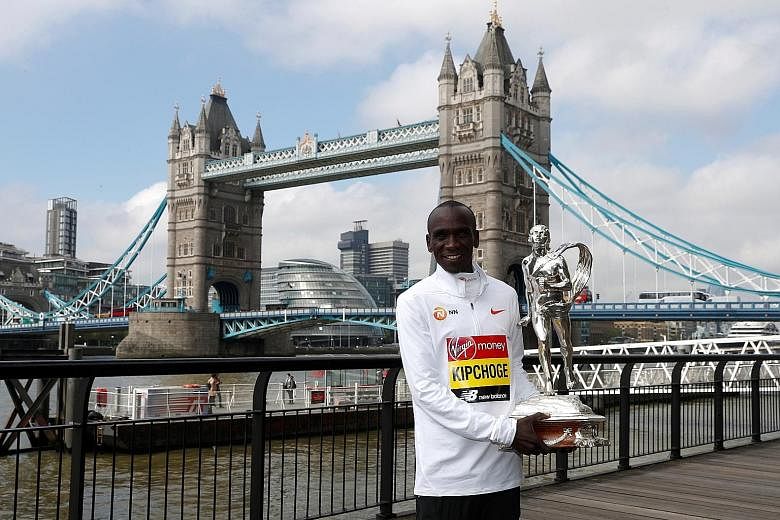LONDON • Eliud Kipchoge is the world-record marathon holder, the Rio Olympics champion, the man who nearly became the first runner to go under two hours in a staged event in Italy in 2017, and now winner in 12 of the last 13 marathons in which he has competed in.
In fact, the last time he failed to cross the finishing tape in first place was back in 2013 in Berlin.
So how did arguably the greatest marathon runner of all time become so good?
No, it has nothing to do with his carbon-fibre plated Nike shoes that some sports scientists estimate have helped him by as much as four per cent.
To his critics, Kipchoge, fresh off his fourth London Marathon win on Sunday, has challenged them to wear the same shoes yet retain the same belief of one day "running under two hours".
What the 34-year-old Kenyan, who runs a maximum of two marathons in a year, will reveal is that a decent period of recuperation and preparation is essential.
He said: "All the team - the coaches, the medical staff - believe that if you run many marathons, then you can't run strong marathons.
"We prepare well, plan well, then run a beautiful marathon. Then come back, relax, prepare well and plan again.
"The training is intense. Those running five a year, I want to meet them and ask them to describe their training.
"It takes three, four months to make your mind cool and confident. You need to be ready in your head. To feel inspired.
"The mind drives the body. The body can't drive the mind. If the mind is tired, you are done and when you train, you hit the wall often."
His training base of Kaptagat near Kenya's Great Rift Valley is also key to his success as his attitude, like many of his countrymen, of "just getting on with it".
Marathon enthusiast Matthew Fox of Australia, who trained for a month with Kipchoge and his team in August 2017, said: "They were always ready to adjust. They did have a plan, a weekly structure... Kenyans' attitude to training is incredibly flexible."
Kipchoge runs about 200km a week at an altitude of 2,500m above sea level. His daily lifestyle is "incredibly simple" while his diet consists of fruits and vegetables.
Fox added: "He also drinks a lot of tea with a lot of sugar. Instead of protein shakes, he'd have two litres of tea. In his down time, he'll just relax and sleep... The lifestyle in Kenya is simple, he takes it to the extreme."
Kipchoge had started his career in the 5,000m. Aged 18, he won gold in the event at the 2003 World Championships in Paris and took the bronze and silver at the 2004 Athens and 2008 Beijing Olympics.
But it was switching to the marathon in 2013 that has been the making of him. As a runner's body gets older, it can tolerate longer distances, and appreciate less intensity, and Kipchoge has become the event's all-conquering figure.
THE GUARDIAN, THE TIMES, LONDON

